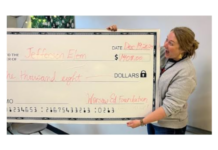INDIANAPOLIS – Indiana Attorney General Greg Zoeller today announced a $125 million, 48-state settlement with Cephalon and its affiliated companies, resolving allegations that the company engaged in anticompetitive conduct to protect the monopoly profits it earned from its landmark wakefulness drug, Provigil.
According to the settlement, Cephalon’s conduct delayed generic versions of Provigil from entering the market for several years, resulting in consumers and state entities paying higher prices for the drug.
“These anti-market tactics are particularly distressing in the medical field, where prices are already high and people struggle to pay for the medications and treatments they need,” Zoeller said. “Pharmaceutical companies cannot abuse our regulatory framework in order to keep drug prices artificially high and protect their profits at the expense of consumers.”
As patent and regulatory barriers that prevented generic competition to Provigil neared expiration, Cephalon intentionally defrauded the Patent and Trademark Office to secure an additional patent, which a court subsequently deemed invalid and unenforceable. Before that court finding, Cephalon delayed generic competition for nearly six years by filing patent infringement lawsuits against all potential generic competitors.
Cephalon settled those lawsuits in 2005 and early 2006 by paying the generic competitors to delay the sale of their generic versions of Provigil until at least April 2012. Because of that delayed entry, consumers, states and others paid hundreds of millions more for Provigil than they would have had generic versions of the drug launched by early 2006, as expected.
The settlement announced today includes a total $35 million for distribution to consumers who bought Provigil.
Indiana’s total recovery will be about $5.4 million consisting of an estimated:
- $3.7 million to compensate for Provigil purchases by certain state entities or authorized purchases off of state contracts
- $872,000 for distribution to Indiana consumers for payments for Provigil
- $823,000 for Indiana’s share of disgorgement and costs
This multistate settlement was facilitated by litigation brought against Cephalon by the Federal Trade Commission. In May 2015, the FTC settled its suit against Cephalon for injunctive relief and $1.2 billion, which was paid into an escrow account. The FTC settlement allowed for those escrow funds to be distributed for settlement of certain related cases and government investigations, such as those of the 48 states.
The settlement is subject to court review, including providing consumers with notice and an opportunity to participate in, object to, or opt out of the settlement.
The states expect court review will be provided by Judge Mitchell Goldberg of the Eastern District of Pennsylvania, who is currently overseeing other litigation concerning Provigil against Cephalon and others.
Zoeller thanked Deputy Attorney General Amanda Lee for her work on this case.





